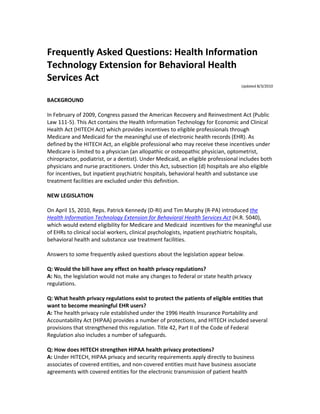
Kennedy hit bill fa qs updated 8 3-2010
- 1. Frequently Asked Questions: Health Information Technology Extension for Behavioral Health Services Act Updated 8/3/2010 BACKGROUND In February of 2009, Congress passed the American Recovery and Reinvestment Act (Public Law 111-5). This Act contains the Health Information Technology for Economic and Clinical Health Act (HITECH Act) which provides incentives to eligible professionals through Medicare and Medicaid for the meaningful use of electronic health records (EHR). As defined by the HITECH Act, an eligible professional who may receive these incentives under Medicare is limited to a physician (an allopathic or osteopathic physician, optometrist, chiropractor, podiatrist, or a dentist). Under Medicaid, an eligible professional includes both physicians and nurse practitioners. Under this Act, subsection (d) hospitals are also eligible for incentives, but inpatient psychiatric hospitals, behavioral health and substance use treatment facilities are excluded under this definition. NEW LEGISLATION On April 15, 2010, Reps. Patrick Kennedy (D-RI) and Tim Murphy (R-PA) introduced the Health Information Technology Extension for Behavioral Health Services Act (H.R. 5040), which would extend eligibility for Medicare and Medicaid incentives for the meaningful use of EHRs to clinical social workers, clinical psychologists, inpatient psychiatric hospitals, behavioral health and substance use treatment facilities. Answers to some frequently asked questions about the legislation appear below. Q: Would the bill have any effect on health privacy regulations? A: No, the legislation would not make any changes to federal or state health privacy regulations. Q: What health privacy regulations exist to protect the patients of eligible entities that want to become meaningful EHR users? A: The health privacy rule established under the 1996 Health Insurance Portability and Accountability Act (HIPAA) provides a number of protections, and HITECH included several provisions that strengthened this regulation. Title 42, Part II of the Code of Federal Regulation also includes a number of safeguards. Q: How does HITECH strengthen HIPAA health privacy protections? A: Under HITECH, HIPAA privacy and security requirements apply directly to business associates of covered entities, and non-covered entities must have business associate agreements with covered entities for the electronic transmission of patient health
- 2. information. In addition, the law in most cases prohibits payments to covered entities for the use of patient health information for marketing purposes without patient authorization. The law also authorizes increased civil monetary penalties for HIPAA violations and allows state attorneys general to enforce HIPAA privacy and security requirements. Q: Would the bill alter existing patient privilege law? A: The bill preserves HITECH protections of established patient privilege laws such as the psychotherapist-patient privilege established in the U.S. Supreme Court in Jaffee v. Redmond (1996). Section 13421 of HITECH also protects from preemption those state laws that are more protective of privacy. Q: Are a clinician’s therapy notes protected? A: HIPAA prohibits the disclosure of a clinician’s therapy notes and the HITECH Act’s privacy provisions extend that protection to electronic health records. Q: What other provisions related to health privacy does HITECH include? A: HITECH requires that patients receive notification of any unauthorized disclosures or uses of their health information and allows patients to request a list of all disclosures made through the use of EHRs. Under the law, personal health record vendors also must inform patients of any unauthorized disclosures of their medical information. In addition, the law in most cases prohibits the sale of patient health information without written patient authorization. The law also allows patients to pay out of pocket for health services and request that their providers not submit claims to their health plans. Q: What new professionals who provide mental health and addiction services would the legislation make eligible to become meaningful EHR users? A: The bill would expand the list of eligible professionals to include clinical psychologists and clinical social workers, both of which provide psychological services and are recognized to bill independently under Medicare and Medicaid. Q: What additional facilities that provide mental health and addiction services could receive increased payments under the legislation? A: The bill would allow mental health and substance abuse treatment facilities that have at least 10% their patient volume attributable to Medicaid recipients to receive increased facility payments. In addition, private psychiatric hospitals that have at least 10% their patient volume attributable to Medicaid recipients could receive these payments. Q: Where can I find additional information on becoming a meaningful EHR user? A: The Centers for Medicare and Medicaid Services proposed a rule in January on meaningful EHR use available online.
